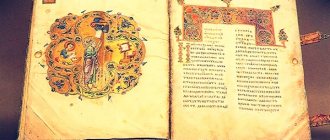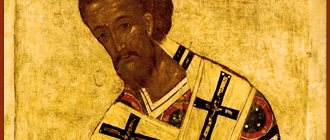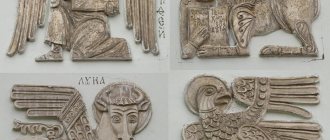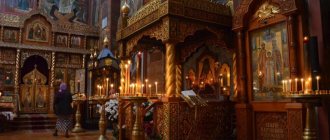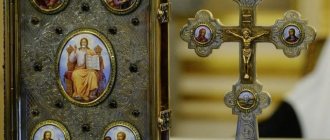The Gospel of John: Meaning in the Word
In the New Testament, after the Gospels of Matthew, Mark and Luke, comes the Gospel of John. Its author is the holy Apostle John, who was one of the first to be called among the disciples: He saw the other two brothers, James Zebedee and John his brother, in a boat with Zebedee their father, mending their nets, and called them. And they immediately left the boat and their father and followed Him (Matthew 4:21-22).
First theologian
Ostromir Gospel
The Church calls the holy Apostle John the Theologian. Why? After all, if theology is the word about God, and a theologian is one who speaks about God (by the way, the ancient Greeks called poets who wrote about the origin of the gods “theologians”), then every apostle is a theologian. This is true. But the Church singled out one from among the disciples of the Lord - the Apostle John - because it was his Gospel that reveals for Christians the doctrine of the eternal existence of God the Father, the Son and the Holy Spirit, speaks of spiritual rebirth in the Sacrament of Baptism, the need to eat the Flesh and drink the Blood of the Son of God and about much, much more. The spiritual height of the fourth Gospel was the reason why the Apostle John was called the Theologian. But this does not mean that the first three Gospels are not as spiritually significant or deep in meaning. This only means that all four Gospels complement each other and fully demonstrate to the believers Christ the Savior and His feat.
At first
If the holy apostle and evangelist John the Theologian were asked the question: “What is the meaning of life?”, he would certainly answer that the meaning of not only life, but everything in general is in the Word. The first lines of John's Gospel solemnly proclaim: In the beginning was the Word, and the Word was with God, and the Word was God. It was in the beginning with God. Everything came into being through Him, and without Him nothing came into being that came into being (John 1 :1-3). It is interesting that the first verse of the fourth Gospel is consonant with the first verse of the book of Genesis, with which the Holy Scripture of the Old Testament begins: In the beginning God created... (Genesis 1: 1). Both Genesis and the Gospel of John speak about creation: God creates and the Word gives rise to everything that exists, nothing can exist without the Word. In the Greek original of the Gospel of John, two complex terms were used that were already used in ancient philosophy: “arche” (beginning, control) and “logos” (word, speech, meaning). So, “arche” is not just the beginning, “arche” is what determines the further existence and development of things. “Logos” is not just a word, it is God the Word Himself, the Son of God, through whom God calls the world into existence. Therefore, all creation has its origin and existence in God, is determined and governed by God, and only in God does it find its true meaning. The life of the world is God.
For what
The Gospel of John is centered around three phrases: the Word became flesh and dwelt among us, full of grace and truth (John 1:14 ); For God so loved the world that he gave His only begotten Son, so that whoever believes in Him should not perish, but have eternal life (John 3:16 ); I came so that they might have life and have it more abundantly (John 10:10 ). God the Word, the Son of God became flesh. What does this mean? This means that God became like the rest of us - a man.
Let us turn once again to the ancient Greeks. In ancient Greek philosophy, the flesh is something lower, something from which one must free oneself; the body, the flesh, is the prison in which the human soul is imprisoned. The Gospel of John literally overturns these ideas. God became flesh, man, to save man. The Son of God became flesh because God the Father loved His creation so much that the Son's life was given for the life of the whole world. Through the incarnation of the Son of God, the world received not just life, but life abundantly. Abundant life is the absence of any lack, because God makes up for everything, makes up for any weakness and sorrow.
The second chapter of the Gospel of John describes the first miracle of the Lord Jesus Christ - the transformation of water into wine at a wedding in Cana of Galilee (see: John 2: 1-10). It may seem strange - the eternal God the Word, who became incarnate for the salvation of man, revealing grace and truth, suddenly turns water into wine. But here we need to try to look “inside” this story. A wedding feast is the most joyful celebration for which friends and relatives are ready to leave all their affairs and worries in order to rejoice with the newlyweds. Suddenly the wine ran out... This means that the feast will have to be stopped unexpectedly, which can cast a shadow of condemnation and ridicule on the groom - what kind of groom is he if he couldn’t even calculate the amount of food?! Christ makes up for the lack of wine, the feast and joy continue. The wedding feast is a picture of the joy of believers in the Kingdom of God. There is no longer any lack or sorrow. The joy of being completely with God. God the Word became man so that everyone who believed in this would join the eternal life of God, which is life in all its fullness and joy.
Paths to God
How can one come to faith in God incarnate to receive abundant life? The Evangelist John describes different paths. Here you can see a feature of the Fourth Gospel - the dialogues of the Lord Jesus Christ with people. But each dialogue actually has one goal - to open for the interlocutor the only valuable understanding of life.
The first dialogue is a conversation with Nicodemus. Nicodemus is a respected teacher of the law and one of the leaders of the Jews (John 3: 1), he comes to Christ at night. Nicodemus praises Christ: Rabbi! we know that You are a teacher come from God; for no one can do such miracles as You do unless God is with him (John 3 :2). The Teacher’s answer is striking in its unexpectedness and depth: truly, truly, I say to you, unless someone is born again, he cannot see the Kingdom of God (John 3 :3). It is not enough to see in Christ a teacher from God, it is not enough to see His works. It all starts with rebirth. Nicodemus does not understand: how can a person be born when he is old? Can he really enter his mother’s womb another time and be born? (John 3 , 4). Indeed, how can one be born a second time? Christ is not talking about some miraculous second physical birth from the mother, not about the transmigration of the soul into another body, or anything like that. Christ speaks about the internal rebirth of man: truly, truly, I say to you, unless someone is born of water and the Spirit, he cannot enter the Kingdom of God. That which is born of the flesh is flesh, and that which is born of the Spirit is spirit (John 3 :5-6). Nicodemus is surrounded by the darkness of the night; he does not yet understand the words of the Lord. But the words of the Lord are addressed not only to Nicodemus, they are addressed to everyone who reads the Gospel. You cannot come to Christ and remain the same person. You need to be born for God. In the Church, the Sacrament of Baptism becomes a new birth from water and the Spirit (in the literal sense of these words) - by immersing in water, a person who believes in Christ is washed from sinful impurity and is born by the grace of the Holy Spirit into new life.
Then - a conversation with the Samaritan woman. The Jews did not communicate with the Samaritans. And they even fought. Probably not every Jew would talk to a Samaritan. Therefore, when the Lord asks the Samaritan woman for water, she is surprised: how can you, being a Jew, ask me, a Samaritan woman, for a drink? (John 4 :9). The Lord answers: if you knew the gift of God and Who says to you: Give Me a drink, then you yourself would ask Him, and He would give you living water (John 4:10 ). The woman continues to think about ordinary water (like Nicodemus, who thought about being born again from his mother) and wonders: where do you get living water from? Are you greater than our father Jacob, who gave us this well and drank from it himself, and his children, and his cattle? (John 4 , 11–12). To believe in Christ, you need to overcome the most familiar ideas (Samaritans do not communicate with Jews), even paternal traditions (are you really greater than Jacob?), in fact, we are talking about the same new birth. We need to forget about what we knew and what we are accustomed to, look not for the temporary (water from a well to which we need to come again and again), but for living water coming from God, that is, the grace-filled gifts of God.
Another example of the path to God is a man born blind, healed by Christ (see: John 9 , 1–41). The Lord says: I must do the works of Him who sent Me... while I am in the world, I am the light of the world (John 9 :4-5). The man born blind did not see the light. The Lord, spitting on the ground, makes clay and, anointing the eyes of the man born blind, sends him to wash in the Pool of Siloam (see: John 9 :6-7). Again we see ablution with water. The one born blind seems to be born again, no longer to live in darkness, but to see the light: one thing I know is that I was blind, but now I see (John 9:25 ). The Pharisees are trying to convince the healed man that Jesus, who healed him, is a sinner (see: John 9:24 ). But the one who has received his sight does not believe them. Even the most authoritative human arguments should not obscure God from us. He who has seen the light should not return to darkness.
True
Jesus answered: ...For this purpose I was born and for this purpose I came into the world, to testify to the truth; everyone who is of the truth listens to my voice (John 18:37 ). These are words from another dialogue of the Lord Jesus Christ. This is a conversation with Pilate, to whom Jesus Christ was handed over for trial. What is truth? (John 18:38 ) - Pilate asked Christ, but he himself did not wait for an answer. The truth is that Christ is the Son of God, God the Word, who became man. The Lord Himself says: I am the way and the truth and the life; no one comes to the Father except through Me (John 14 :6); I am the bread of life; he who comes to Me will never hunger, and he who believes in Me will never thirst (John 6:35 ); I am the good shepherd, the good shepherd lays down his life for the sheep... I know Mine, and Mine know Me. As the Father knows Me, [so] I know the Father; and I lay down My life for the sheep (John 10 , 11, 14–15); I am the resurrection and the life; He who believes in Me, even if he dies, will live. And everyone who lives and believes in Me will never die. Do you believe this? (John 11 , 25–26).
Christ is Truth incarnate. You just need to come to Him and believe...
Newspaper "Orthodox Faith" No. 1 (501)
John the Evangelist is considered the author of the Gospel, Revelation and Epistles
Little is known about the life of the Apostle John the Theologian. Together with his older brother Jacob, he was called by Christ.
Christ called the Zebedee brothers “sons of thunder” for their impetuosity of character
Together with the other apostles he accompanied Christ.
After the Crucifixion, he was given Asia Minor to preach.
Deacon
minister of the Christian church. The first seven deacons were appointed by the apostles
Until the Dormition of the Mother of God, John remained in Jerusalem, then, together with one of the seven deacons, Prokhor, he sailed to the city of Ephesus.
He got into a shipwreck, but was saved by the Lord.
He performed miracles in Ephesus, one of which was the destruction of the temple of Aphrodite. For this, John was exiled to the island of Patmos.
In exile on Patmos, John wrote Revelation
Emperor Nerva allowed John to return from exile.
The apostle returned to Ephesus and lived there until his death. In the last years of his life he wrote the Gospel.
John the Theologian
the only apostle who died a natural death
Holy Tradition claims that the Apostle John died at the age of over a hundred years.
The Book of Glory Contains Christ's Instructions
The Last Supper is the plot of chapter 13.
Chapter 14, like chapter 15, contains Christ’s instructions to his disciples and gives an understanding of the path to God:
I am the way and the truth and the life; no one comes to the Father except through Me...
(John 14:6)
He who does not love Me does not keep My words; But the word that you hear is not Mine, but the Father who sent Me...
(John 14:25)
Whoever does not abide in Me will be cast out like a branch and wither; and such branches are collected and thrown into the fire, and they burn...
(John 15:6)
Chapter 17 contains Jesus' prayer for the disciples, for their faithfulness and unity.
Chapter 19 describes the Passion of Christ and coincides with the other Gospels.
Chapter 20 talks about the Resurrection
The Gospel ends with simple and understandable words:
Jesus did many other things; but if we were to write about it in detail, then I think the world itself would not be able to contain the books written. Amen.
(John 21:25)
By leaving a comment, you accept the user agreement
The Gospel is divided into four parts
Theologians divide the Gospel of John into 4 semantic parts: Prologue (1:1-1:18), Book of Signs (1:19-12:50), Book of Glory (12:51-20:31), Epilogue (21)
Chapter 1 contains basic ideas about Christ:
In the beginning was the Word, and the Word was with God, and the Word was God...
(John 1:1)
And to those who received Him, to those who believed in His name, He gave the power to become children of God,
who were born neither of blood, nor of the will of the flesh, nor of the will of man, but of God.
And the Word became flesh and dwelt among us, full of grace and truth; and we saw His glory, glory as of the only begotten of the Father.
(John 1:12-14)
for the law was given through Moses; grace and truth came through Jesus Christ...
(John 1:17)
The Gospel echoes the book of Genesis:
In the beginning God created the heaven and the earth…
(Gen. 1:1)
The problem posed in the Prologue about who Christ really is runs like a thread through the Gospel. People who meet Christ try to understand who he is. Some people succeed.
Then the woman left her waterpot and went into the city, and said to the people, “Come, see a man, who told me all things that I have done: is not this the Christ?”
(John 4:28-29)
and some don't:
Many of the people believed in Him and said: when Christ comes, will He really do more signs than He has done?
The Pharisees heard such talk about Him among the people, and the Pharisees and the high priests sent servants to arrest Him.
(John 7:31-32)

